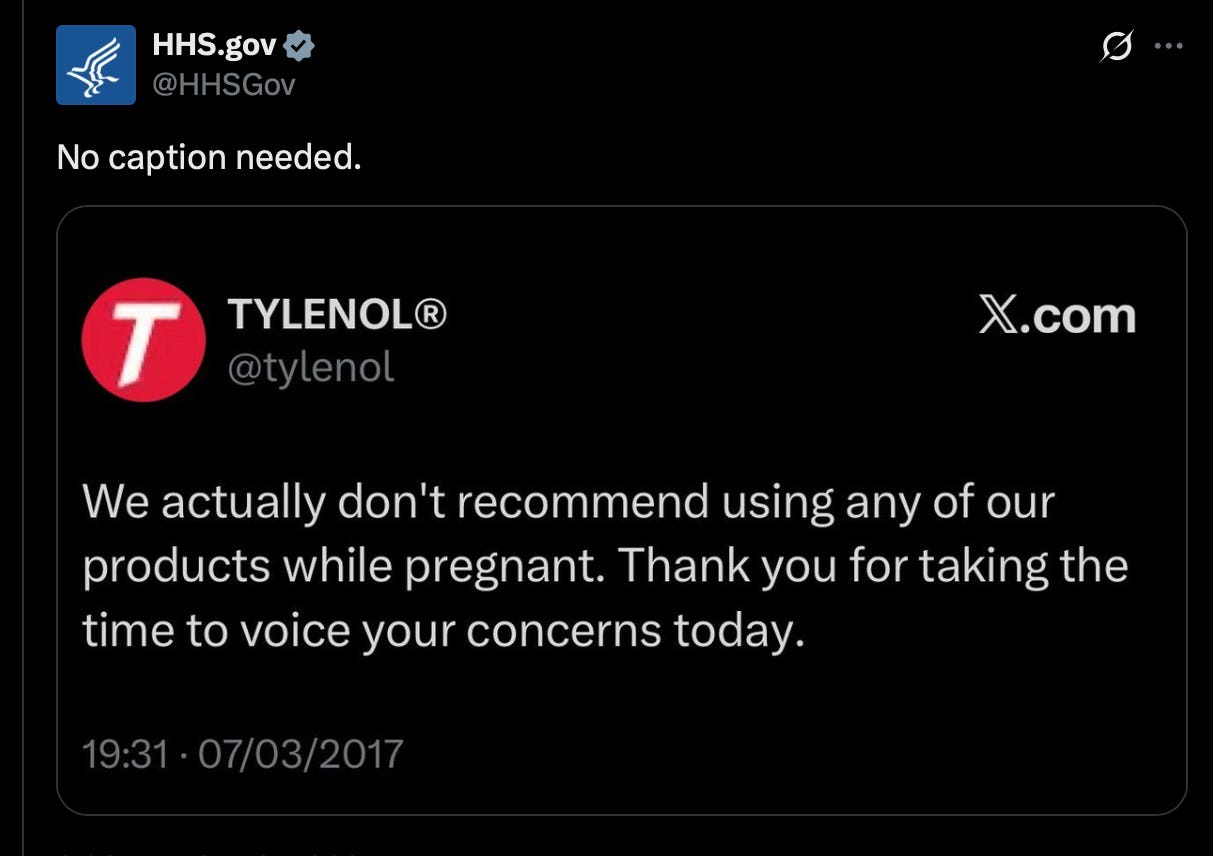Tylenolgate
and what the heck causes autism?
Good morning everyone and TGIF.
Let’s start off with something light: What causes autism?
President Trump and the MAHA men—RFJ Jr., and Drs. Bhattacharya of the NIH, Makary of the FDA, and Dr. Oz of Wicked—held a press conference that, unfortunately but unsurprisingly, did not answer this question.
The biggest takeaway was President Trump saying that Tylenol during pregnancy is “not good,” highlighting research that links prenatal Tylenol use to autism later in childhood. (Running On Butter wrote about this back in August. Sorta tacky for the White House not to give ROB proper credit, but whatever.)
Now, the hottest form of #Resistance is for pregnant people (their language, not mine 🫃🤰) to snack on Tylenol pills as if they are Lifesaver mints.
Here we have medical doctor and fertility specialist Michelle Vu single-handedly saving democracy as she takes Tylenol at 28 weeks’ gestation. “It’s gonna work like a charm, and my baby won’t have autism,” she says defiantly. Take that, Trump!
The Tylenol PR team is working harder than ICE agents. They insist it’s safe during pregnancy and allegedly worked overtime to persuade RFK Jr. to drop this from his MAHA agenda before Monday’s announcement.
But in a social media takedown destined for Twitter/X history, HHS resurfaced a self-damning Tylenol post from 2017.
It’s like a breakup where both partners are desperate to set the record straight. “He said this!” the girlfriend tells the friend group. “But she did that!” he fires back. Then the girl drops the screenshots showing just how toxic he really was. And screenshots don’t lie, dude.
The #Resistance media is also on the case:
Mother Jones called the autism press conference “eugenist” (it wasn’t).
Barack Obama said it was “violence against the truth,” which is exactly what I say to my boss when he tells me I can’t use the company card to buy a month’s worth of grass-fed butter. It’s for business reasons, okay, David?
The New York Times said Trump’s warnings were “based on an unproven link between Tylenol and autism,” which is basically what every other outlet wrote as well.
But what about Running On Butter? Where do we Buttercups stand on autism and Tylenol?
The challenge with finding the “cause” of autism is that autism itself is not a singular condition. Some of the most scientifically brilliant minds in history have been autistic, while others live with profound physical and social impairments.
Unlike conditions like diabetes, cancer, or an infection—where there’s usually a clear culprit (insulin resistance, cancerous cells, or a specific bacteria)—autism doesn’t have a single biochemical smoking gun.
It’s a clinically observable condition, but not one that can be pinpointed in the lab. You don’t discover autism the way you discover cancer cells, irregular blood sugar, or an infection. Instead, like most mental health conditions, the diagnostic process relies on questionnaires that assess behavior and social-emotional competency.
That’s not necessarily a bad thing.
(Though I’m uneasy with the subjectivity involved in labeling kids. Especially when that label often leads to medication. One pediatrician might hand out a Risperidone prescription, a medication with serious side-effects that up to 60% of kids diagnosed with autism are prescribed, while another wouldn’t even make the diagnosis, let alone medicate. And even among adults, I’m not a fan of how a self-diagnosis of being “on the spectrum” can sometimes serve as a free pass for being unfocused or unreliable.)
My point is to highlight the complexity of this very real—and often very challenging—condition, and to posit that its varied manifestations may well stem from equally varied root causes.
There are myriad of factors, that in my opinion—supported by a plethora of research—are contributing to the increased autism rates.
We’re seeing an increasingly strong link between autism and gut health. A 2023 meta-analysis found that children with autism tend to have much higher levels of Candida—a yeast that lives in the gut microbiome. Candida thrives on cheap carbs, which is why many doctors recommend cutting refined carbs from the diets of kids on the spectrum.
The research on the brain-gut axis is overwhelming: what you eat shapes how you think and behave. That’s true for everyone, but for neurodivergent kids, diet can mean the difference between daily meltdowns and calmer, more stable behavior.
Autistic individuals are often severely deficient in key vitamins and minerals. One study found that supplementing autistic children with vitamin B6 and magnesium led to notable improvements in hyperactivity and aggression. When the supplements were discontinued, however, those behavioral challenges resurfaced within weeks.
Heavy metals levels are also significantly burdensome on kids with autism. So too are microplastics. And phthalate exposure in utero. And screen time as toddlers and kids.
And yes, Tylenol, it seems, during pregnancy.
I wrote this Tylenol-autism link back in August (you can call my work timeless):
“A really well done, new study suggests that acetaminophen (Tylenol) use during pregnancy may be linked to higher rates of ADHD and autism in children.
Tylenol crosses the placental barrier and may trigger oxidative stress, disrupt hormones, and cause epigenetic changes that interfere with fetal brain development.
About half of pregnant women take Tylenol. “Given the widespread use of this medication, even a small increase in risk could have major public health implications,” noted study author Dr. Diddier Prada.”
This was the study President Trump and RFK Jr. highlighted in their press conference. Does it prove Tylenol is the cause of autism? No. And neither of them said that.
But as the FDA commissioner told The Free Press:
“When the dean of the Harvard School of Public Health is waving a flag about an epidemic that barely existed a generation ago—now affecting over two million kids—and when most acetaminophen prescriptions are unnecessary, don’t you have a moral obligation to share that research?”
His answer was clear:
“We felt that we had an obligation. We didn’t restrict acetaminophen, but we made the information available.”
We won’t ever find a single “cause” of autism because, as presented, autism covers a lot of different realities, with many independent factors contributing.
Succinctly put: American kids’ brains are highly inflamed. They’re being conceived and raised in a world full of toxic waste, without the nutrients or lifestyle needed to detoxify that behavior-altering toxicity.
Wait, did Running On Butter just solve the autism crisis?









Very helpful!
You are right..The cause of autism is nuanced and we could point to gut health, heavy metals, blocked detoxification pathways, chemicals, dyes and additives in food. I also found it interesting that it was all about Tylenol when there are so many other products that are taken OTC that contain acetaminophen.